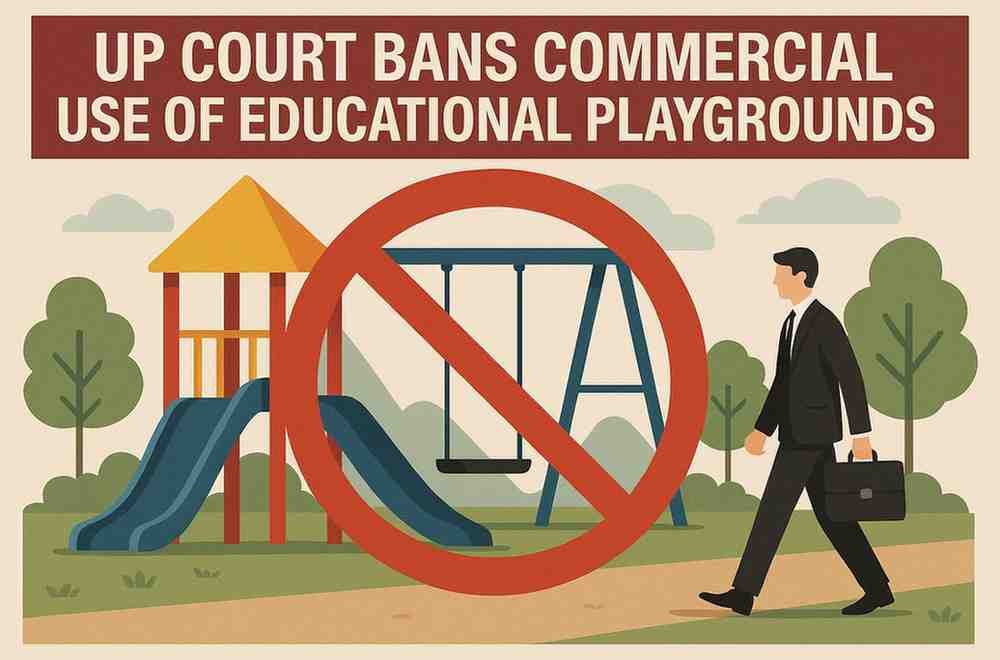UP Court Bans Commercial Use Of Educational Playgrounds
In a significant ruling aimed at preserving the sanctity of educational spaces, the Allahabad High Court has prohibited the use of immovable properties belonging to educational institutions, including their playgrounds, for any form of commercial activity. The directive applies to schools, colleges, and universities across Uttar Pradesh, ensuring that such spaces are reserved strictly for academic and co-curricular purposes.
The bench, comprising Chief Justice Arun Bhansali and Justice Kshitij Shailendra, passed the order while hearing a Public Interest Litigation (PIL) filed by Girja Shankar, who sought the court’s intervention to stop a commercial fair being held within the premises of Brahmanand Degree College in Rath, Hamirpur district. The college, which is affiliated with Bundelkhand University, Jhansi, had reportedly been allowing a commercial mela to operate in its open grounds since last year.
Court Emphasizes Educational Purpose Of Institutions
The High Court, after carefully examining the arguments and evidence, emphasized that educational institutions exist solely for the purpose of imparting education and related developmental activities. The judges observed that the infrastructure of such institutions, including classrooms, halls, and playgrounds, must be utilized exclusively for academic, sports, and cultural events that contribute to the educational environment.
The court remarked, “Educational institutions are meant for imparting education only and the land and building belonging to such institutions, including their playgrounds, cannot be permitted to be used for holding any commercial activity under any name, like exhibitions, trade fairs or other kinds of fairs, or sale of goods.”
Reiterating the role of these institutions in shaping young minds, the bench added that any deviation from their intended purpose would undermine the essence of education. The infrastructure, it said, should be used only for activities such as sports events, cultural programs, inter-school competitions, and similar educational pursuits organized by the institutions themselves.
Government Directed To Issue Circular
The High Court further directed the Uttar Pradesh government to issue a comprehensive circular within one month, instructing all district administrations, police authorities, and educational institutions to comply strictly with the ruling. The circular must clearly prohibit the use of educational premises, especially playgrounds, for commercial or profit-oriented events.
The bench instructed the state to ensure that its directive reaches every educational level—right from primary schools to universities—so that such practices are not repeated in the future. The order also holds district and police administrations accountable for enforcing the ban effectively.
PIL Sparks Wider Discussion
The case has sparked a broader conversation about the commercialisation of educational spaces in India. Many institutions, particularly government-aided colleges and schools, have in recent years rented out their playgrounds or auditoriums for private fairs, exhibitions, and events to generate additional income.
However, educationists and child rights advocates have long argued that such activities disrupt the academic environment, reduce available space for students, and compromise the moral fabric of institutions. The court’s ruling, therefore, is being viewed as a crucial step towards restoring the educational purpose of these campuses.
Impact Across Uttar Pradesh
The Allahabad High Court’s decision will have far-reaching implications for thousands of educational institutions across Uttar Pradesh. District authorities are expected to conduct inspections to ensure compliance once the government issues its circular.
Legal experts say the ruling sets a strong precedent against the commercialization of public and semi-public educational spaces, aligning with the larger vision of maintaining the purity of academic environments.
The verdict is also expected to discourage administrators from engaging in unauthorized collaborations with event organizers or businesses that exploit institutional spaces for profit.
By reaffirming that the role of educational infrastructure is to serve learning and development—not commerce—the Allahabad High Court has reinforced a vital principle of public education policy.







